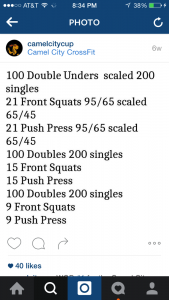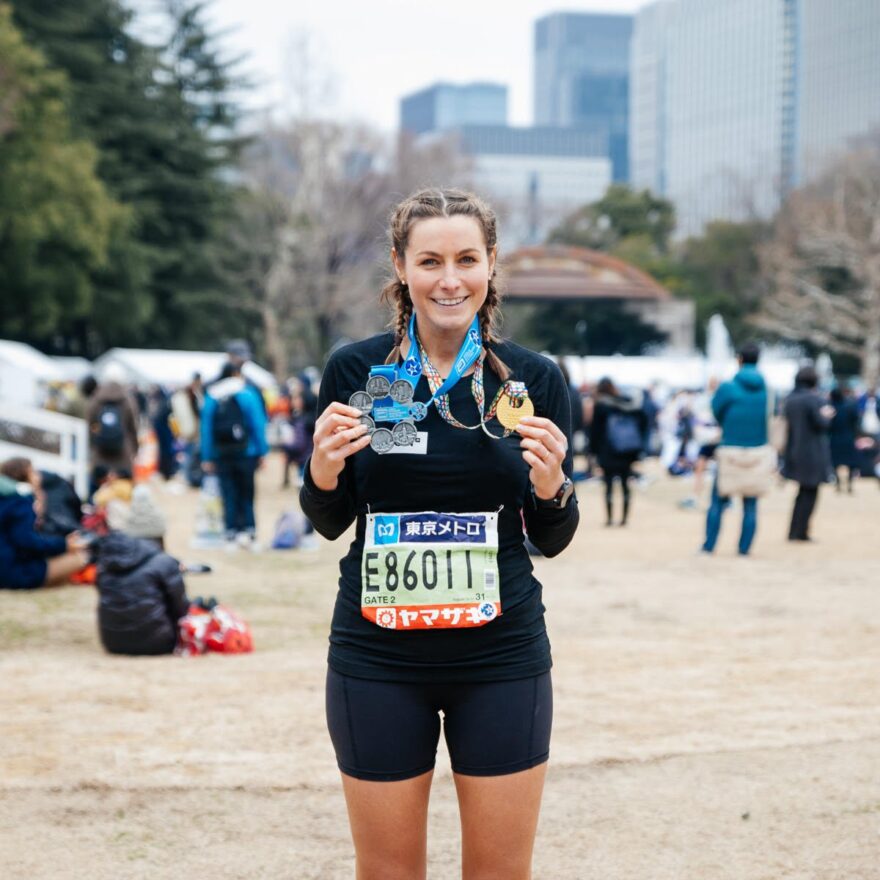


Wondering what to eat on race morning? Learn the most important things to consider and see one of our favorite pre marathon breakfasts!
Hi A Foodie Stays Fit readers! I’ve read Teri’s blog for years and am thrilled that she asked me to write a guest post for you all.
I’m Charlie, also known as The Runner Beans online. I’m a Registered Dietitian working for the NHS (National Health Service) in the UK, 13 time marathoner, and author of runner’s cookbook ‘Cook Eat Run’. I believe nutrition doesn’t have to be complicated, even when it comes to fueling for a marathon and the miles of training that goes into getting us to the start line.

Whilst we focus a lot on the meals we eat the night before and our breakfast pre-race, it’s important to consider what we’re eating in the weeks and months prior. We put so much emphasis on carb loading. But when was the last time you thought about how you’re fueling your Tuesday track session, or a Thursday tempo. (Check out my blog on What to Eat Before Running in the Morning when you don’t have much time).
When we workout, most of our fuel comes from the stored fat and carbohydrate (glycogen) in our body. This comes from the food that we’ve eaten in the days before the run/workout. What you eat immediately before you run won’t be stored as glycogen. But does influence the fuel mixture that your muscles utilise during the workout. E.g. if you eat a meal high in carbs pre-workout, then you’ll burn a higher proportion of carbohydrates during the session. And this is particularly useful for speed work. Combining protein and fat with carbohydrates can help fuel longer runs, raise blood glucose levels and keep hunger at bay. A meal complete with macro-nutrients can help delay the onset of fatigue, improve endurance and performance.
We are all different, as are our nutrition needs, however the fundamentals are fundamentally simple. We should be aiming for a combination of macro-nutrients; protein, carbs and fat.
‘When athletes compete in endurance events it is carbohydrates, not fat-based fuels that are the predominant fuel for the working muscles, and carbohydrate, not fat, availability that become rate limiting for performance.’
Hawley and Leckey, Sports Medicine, 2015
Carbohydrates, broken down into glucose, are our bodies favorite energy source. Glucose is readily available for the body to use quickly and efficiently. And can be stored as muscle and liver glycogen to utilize during exercise. However, these stores are finite (usually only enough to fuel you for 18-20 miles!). And that is why it’s crucial to get your carbs in both before the race and mid-race to keep glucose stores topped up.
Ideally between 40 – 60% of our overall energy in our diet should be coming from carbohydrates. (Depending on your size and calorie needs, that can be a pretty high number of grams of carbs!) They can be broken into two categories, complex and simple carbs.
These are the ones that are broken down quickly and absorbed into the bloodstream to give a fast energy boost. You can find them in white bread, pasta, fruit, yogurt, milk etc. Complex carbohydrates are released more slowly because it takes the body longer to break them down because they’re made up of multiple sugar groups and give longer-lasting energy. These are the types of carb you want to make up the majority of your carbohydrate intake. Including vegetables and whole grains (quinoa, pearl barley, wholegrain rice and pasta).
These are key to ingest before longer runs and workouts. In combination with simple carbohydrates to replenish glycogen when stores start to get low. For example, having a ½ cup oatmeal with a banana as a pre run breakfast. Then a sports drink or energy gel 60+ mins into the run.
Mostly thought of for post-run recovery, protein’s main role is for cell and tissue growth and repair. Research shows that athletes develop more muscle when they consume protein both before and after a workout, compared with if they consume it at other times during the day. The average adult needs around 0.8g protein per kg/bodyweight per day, whilst runners requirements are usually between 1-1.2g/kg/bodyweight per day.
Fat is essential in the diet, and plays a role in hormone regulation, vitamin absorption, muscle growth and development. It should make up around 20 and 35% of our diet. However, all fat is not created equal. We should be focusing on unsaturated fat sources in our diet, both mono and polyunsaturated. These are mostly found in oils from plants and fish sources, e.g. olive oil, walnuts, almonds, avocado and oily fish.
Both protein and fat slow down the digestion and absorption of carbohydrates and can result in discomfort if you eat too close to your run. However both macronutrients are still important to include in your pre-race meal to help you feel full, and steady to release of glucose to the bloodstream, you just need to make sure you give yourself enough time to digest your meal before, ideally at least 90 minutes before you run.
The closer to your workout, the smaller your meal should be. If you are eating 1-2 hours before your run, you’ll want to consume around 300-400kcals (5kcal/kg/bodyweight, around 2kcals per lb bodyweight). I know a couple of tahini-stuffed dates or runner’s energy balls work well for Teri for shorter runs. However if you’re eating your pre-marathon meal, around 3-4 hours pre-race, you’ll want between 400-800kcals (or 10kcal/kg/bodyweight or around 5kcals per lb bodyweight).
Personally, I eat breakfast around 3-4 hours before the start of the marathon. And then a smaller snack, like a banana or fruit bar, closer to the race start. Whatever you choose to eat pre-race, the most important thing is that you practice it! Eat it before your long run days and races in the lead up to your goal half or full marathon.
I opt for a pre-race coffee for a caffeine boost (and to help get things moving, if you know what I mean!) and a large glass of water with electrolytes. Sports drinks work well for many people. But be sure to test them before race day to make sure they don’t upset your stomach.
And remember, it’s a fine balance between feeling hydrated and not needing to dash into the portaloo right before race time. (Or hit the porta potty…I’m British. I can’t call them that!). The American College Sports Medicine recommends 5-10ml water/kg/bodyweight in the 2-4 hours before the race. Then just small sips until the race start.
In the same way that we need to think about your carbohydrate intake in the lead up to the race, ensuring adequate hydration pre-race is crucial that you aren’t starting race morning dehydrated!
In the past, runners have been advised to glycogen deplete in the week before the race followed by glycogen (carb) loading. However, new advice by sports nutrition scientists recommend that a combination of a reduction in training volume (tapering) with a slight increase of carbohydrate volume in the lead up to race day, (around 8-10g x bodyweight in kg per day for 2-3 days, that’s around 4-5g x bodyweight in lb per day).
I have to admit, I usually have oats as a pre race meal when I travel for races because they’re SO easy to make in a hotel room. Either overnight oats soaked in dairy free milk, topped with berries or banana. Plus a dollop of nut butter, or with hot water added to a pot of porridge oats. However, I wanted to share something a little different as a pre-race meal.
1 medium sweet potato, thoroughly cleaned
1 Tbsp crunchy peanut butter
1 medium banana
1 tsp chia seeds
Preheat the oven to 200°C/400°F.
Using a fork or skewer, poke a number of holes into the sweet potato. Lay it on a baking sheet and roast for 45 minutes–1 hour. Or until the insides are soft and a skewer can be easily inserted. (Alternately, microwave for 5-10 minutes on high).
Carefully remove the potato from the oven and slice in half. Split the potato open and dollop the peanut butter into the middle. Then close it up while you cut the banana to let the butter melt slightly.
Cut the banana into slices and lay on top of the potato halves. Then top with a sprinkling of chia seeds, if using. Serve immediately.
For more nutrition advice for runners, download and listen to my podcast ‘Cook Eat Run’, conversations with Registered Dietitians, Nutritionists and Sports Nutritionists, plus everyday runners achieving amazing things!
You might like this blog and podcast focusing on How to Fuel During a Marathon.
—
Charlie, thank you so much for sharing your wealth of knowledge!! And I LOVE sweet potatoes for breakfast so I can’t wait to try this version!
Teri’s Favorite Running Gear


Leave a Comment